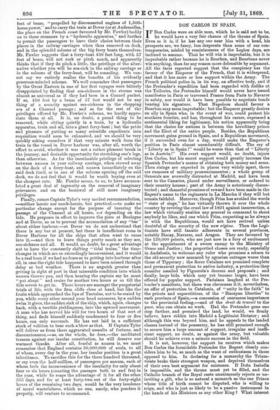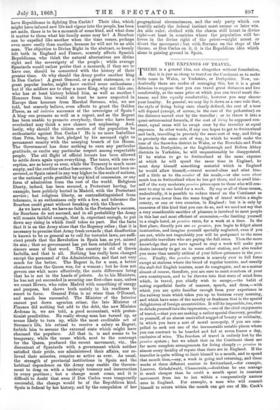DON CARLOS IN SPAIN.
IF Don Carlos were an able man, which he is said not to be, he would have a very fair chance of the throne of Spain. Even as it is, if he has any one near him with a head, his prospects are, we fancy, less desperate than some of our con- temporaries, misled by reminiscences of the Legion days, are inclined to assume. That he will win is improbable, but it is improbable rather because he is Bourbon, and Bourbons never win anything, than for any reason more defensible by argument. All the facts reported suggest that the conspiracy has the favour of the Emperor of the French, that it is widespread, and that it has more or less support within the Army. The French political police is, in its way, an effective body, and if the Pretender's expedition had been regarded with dislike at the Tuileries, the Pretender himself would never have issued manifestos in Paris or traversed France from Paris to Navarre in safety, nor would it have been possible to negotiate bonds bearing his signature. That Napoleon should favour a Bourbon may seem improbable ; but the Emperor greatly desires an ally in Spain who, in the event of war, could protect his southern frontier, and has, throughout his career, expressed a sentimental liking for legitimacy, his notion apparently being that the choice for nations is between the hereditary prince and the Elect of the entire people. Besides, the Republican movement gains ground in Spain, and a Republican movement, if it succeeded even for a day, would make the Emperor's position in Paris almost unendurably difficult. The cry of " Liberty as in Spain !" would be worse than that of " Liberty as in Austria!" His overt support would, no doubt, injure Don Carlos, but his secret support would greatly increase the Spanish Pretender's means of obtaining both money and arms. Then risings are expected in places very widely apart, there are rumours of military pronunciamentos ; a whole group of Generals are avowedly distrusted at Madrid, and have been sent to the Canaries, placed under surveillance, or ordered to their country houses ; part of the Army is notoriously discon- tented ; and shameful promises of reward have been made in the Regent's name to the regiments in La Mancha if they will but remain faithful. Moreover, though Prim has avoided the words " state of siege," he has virtually thrown it over the whole country by reviving the cruel law of 1821 against insurrection, a law which virtually enables any general in command to shoot anybody he likes, and one which Prim, coquetting as he always is with the Republicans, would not have revived unless doubtful of the security of the new regime. Then the Legi- timists have still fanatic adherents in several provinces, notably Biscay, Navarre, and Aragon. They are favoured by the 120,000 priests, who are just now in a fury of excitement at the appointment of a sworn enemy to the Ministry of Grace and Justice ; the propertied classes are ready, especially in Andalusia, to welcome any ruler who promises a return to the old security now menaced by agrarian outrages worse than those of Tipperary ; the fierce Catalans are promised complete and permanent protection to native industry, a protection they consider assailed by Figuerola's decrees and proposals ; and finally, large bids, which may yet become larger, have been offered for popular support. Parisians laughed at the Pre- tender's manifesto, but there was cleverness it it, nevertheless, an offer of protection to Catalonia, of "unity in the faith" to the priests and superstitious, of the "Biscayan liberties" to each province of Spain,—a concession of enormous importance to the provincial feeling,—and of the droit de travail to the poor, who can obtain no work. Had the Pretender gone one step further, and promised the land, he would, we firmly believe, have ridden into Madrid a Legitimist Dictator ; and although this was beyond him, and he appeals to the landed classes instead of the peasantry, he has still promised enough to secure him a large amount of support, irregular and ineffi- cient support, no doubt, as against the army, but valuable should he achieve even a minute success in the field.
It is not, however, the support he receives which makes Don Carlos the formidable Pretender the Regent clearly con- siders him to be, so much as the want of enthusiasm in those opposed to him. In declaring for a monarchy the Trium- virate broke their strongest weapon, and deprived themselves of their own best argument for existence. If Dona Isabella is impossible, and the throne must yet be filled, and the Catholic branch of the Royal caste unanimously rejects so un- inviting a gift, who is so natural a monarch as the one Prince whose title of birth cannot be disputed, who is willing to reign, and who is just as likely to be a passive instrument in the hands of his Ministers as any other King g What interest
have Republicans in fighting Don Carlds B Their idea, which might have infused new life and vigour into the people, has been set aside, there is to be a monarch of some kind, and what does it matter to them what his family name may be A Bourbon can be expelled like another when the time comes, perhaps even more easily than another, because he will not be an able man. The objection to Divine Right in the abstract, so keenly felt both in England and France, scarcely affects Spanish Republicans, who think the natural alternatives are divine right and the sovereignty of the people ; while average Spaniards would rather prefer that a monarch, if they are to have one, should be connected with the history of their greater time. Or why should the Army prefer another king to Don Carlos 1 A great General, or a great statesman, or a great popular leader, might have excited some enthusiasm ; but if the soldiers are to obey a mere King, why not this one, who has at least history behind him, as well as another Honours from him would at least be more respected in Europe than honours from Marshal Serrano, who, we are told, but scarcely believe, even affects to grant the Golden Fleece, as ad interim successor of the sovereigns of Spain A king can promote as well as a regent, and as the Regent has been unable to promote everybody, those who have been overlooked may think a new chance not unpleasing. And, lastly, why should the citizen section of the population be enthusiastic against Don Carlos ? He is no more Isabellino than Prim, being, in fact, pledged by his assumed right to permanent enmity with the usurping branch of his House. The Government has done nothing to earn any particular gratitude, or excite any particular respect among respectable people. The old flight of official locusts has been allowed to settle down again upon everything. The taxes, with one ex- ception, are as heavy as ever, while the Treasury is much more empty, and the creditor rather less secure. Cuba has not been re- covered, or Spain raised in any way higher in the scale of nations, or the national pride gratified by any kind of concession, or any form of admiration from the rest of the world. Religious liberty, indeed, has been secured, a Protestant having, for example, been publicly buried in Madrid, with the Protestant service ; but religious liberty, as contradistinguished from tolerance, is an enthusiasm only with a few, and tolerance the Bourbon could grant without breaking with the Church.
As we have said, we have no faith in the Pretender's success, for Bourbons do not succeed, and in all probability the Army will remain faithful enough, that is, expectant enough, to put down any rising in which itself takes no part. But the facts that it is on the Army alone that the Regency relies ; that it is necessary to promise that Army fresh rewards ; that disaffection is known to be so general as to call for terrorist laws, are suffi- cient proofs that the Revolution in Spain has, as yet, missed its aim ; that no government has yet been established in any sincere sense of that word. The country is rid of Queen Isabella, and that is all. Nothing has really been changed except the personnel of the Administration, and that not very much for the better. The Regent is, for a man, a better character than the Queen was, for a woman ; but he does not govern one whit more effectively, the main difference being that he is not in the hands of priests. As to his Ministers, he has not yet succeeded in securing one first-class man, unless we count Rivero, who rules Madrid with something of energy and purpose, but shows both mainly in his readiness to resort to force. General Prim is no wiser than O'Donnel, and much less successful. The Minister of the Interior cannot put down agrarian crime, the late Minister of Finance did nothing but add to the debt, the new Minister Ardenaz is, we are told, a good accountant, with protec- tionist proclivities. No really strong man has turned up, or seems likely to turn up, while the most creditable act of Serrano's life, his refusal to receive a salary as Regent, forbids him to assume the external state which might have charmed the populace. All that is, is and seems to be temporary, while the cause which, next to the contempt for the Queen, produced the recent movement, viz., the discontent of Spaniards with a government which neither satisfied their pride, nor administered their affairs, nor re- lieved their miseries, remains as active as ever. As usual, the strength of provincial institutions in Spain and the habitual dependence on the Army may enable the Govern- ment to drag on with a bankrupt treasury and insurrection in every province ; but a change must come, and it is difficult to doubt that even if Don Carlos were temporarily successful, the change would be of the Republican kind. Spain is federal by her history, and by the compulsion of her
geographical circumstances, and the only party which can heartily satisfy the federal instinct must sooner or later win. An able ruler, clothed with the charm still latent in divine right—at least in countries where the population still be- lieves in the divine right of the priest—might arrest or divert the movement ; but with Serrano on the steps of the throne, or Don Carlos on it, it is the Republican idea which alone is gaining ground in Spain.































 Previous page
Previous page